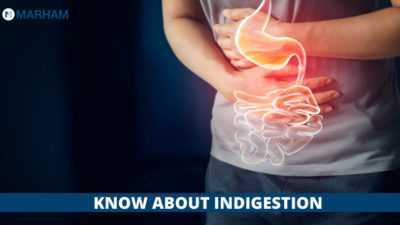Indigestion is also called dyspepsia. It is a pain in the upper abdomen. People search for Indigestion Meaning in Urdu many times. Indigestion is a term that refers to a set of symptoms, such as abdominal pain and a feeling of fullness soon after eating, rather than a disease. Indigestion is a symptom of a variety of digestive disorders. Let’s see details about this problem.
Indigestion Meaning in Urdu
بدہضمی ہونا
Causes Of Indigestion
People search for Indigestion Meaning in Urdu many times. Lets see that what are the factors which cause indigestion. A variety of factors can cause indigestion. Indigestion is frequently linked to a person’s lifestyle and can be triggered by food, drink, or medication. Indigestion’ causes involve variety of factors, including:
- Smoking
- Anxiety
- Certain antibiotics, pain relievers, and iron supplements
- Overeating or eating too quickly
- Fatty, greasy, or spicy foods
- Too much caffeine, alcohol, chocolate, or carbonated beverages
- Irritable bowel syndrome is linked to a condition known as functional or non-ulcer dyspepsia, which is a common cause of indigestion.


Indigestion can be caused by other variety of diseases and problems, including:
- Gastric inflammation (gastritis)
- Peptic ulcers
- Celiac disease
- Gallstones
- Constipation
- Pancreatitis
- Stomach cancer
- Intestinal blockage
- Reduced blood flow in the intestine (intestinal ischemia)
- Diabetes
- Thyroid disease
- Pregnancy
Symptoms Of Indigestion
As you know Indigestion Meaning in Urdu now lets see the symptoms of indigestion. You could have the following symptoms if you have indigestion:
- Early fullness during a meal. You haven’t finished much of your meal yet, but you already feel full and may be unable to finish it.
- Uncomfortable fullness following a meal.
- Fullness lasts longer than it should.
- Pain in the upper abdomen. You have a mild to severe pain between the bottom of your breastbone and your be.
- In the upper abdomen, there is a burning sensation. Between the bottom of your breastbone and your bellybutton, you feel an uncomfortable heat or burning sensation.


- Blood clots in the upper abdomen. You have a tightness in your upper abdomen that you don’t like. Nausea.
- You have a strong desire to vomit. Read more to know how to prevent vomiting.
Vomiting and belching are less common signs and symptoms when people search for Indigestion Meaning in Urdu. Heartburn can occur as a side effect of indigestion. During or after eating, heartburn is a pain or burning sensation in the centre of your chest that may radiate into your neck or back.
Treatment Of Indigestion
Medications may help if your indigestion persists. The first line of defence is usually over-the-counter antacids. Other possibilities include:
- PPIs (proton pump inhibitors) are drugs that can lower stomach acid. PPIs may be recommended, especially if you suffer from heartburn and indigestion. H-2 receptor blockers, which can also help to lower stomach acid. If your stomach empties slowly, prokinetics may be beneficial.
- Antibiotics, which can help if your indigestion is caused by the H. pylori bacteria.
- Antidepressants or anti-anxiety medications, which can help with indigestion symptoms by reducing pain perception.
Prevention for Indigestion
Avoiding the foods and situations that appear to cause it is the best way to avoid getting it. You can keep a food journal to figure out what foods are causing you problems. Other ways to avoid the problem include:
- Eat small meals in the day so your stomach doesn’t have to work as hard or as long, and eat slowly.
- Foods high in acids, such as citrus fruits and tomatoes, should be avoided.
- Keep spicy foods to a minimum.
- Keep fried and greasy foods to a minimum.
- Avoid foods and drinks that have caffeine
- If stress is a trigger, try relaxation and biofeedback techniques to manage it.
- Quit smoking if you’re a smoker. Smoking can irritate your stomach, so don’t light up right before or after you eat.


- Avoid wearing clothing that is too tight and reduce your alcohol consumption. They can put pressure on your stomach, causing food to move up into your esophagus.
- If you’re hungry, don’t work out. It’s best to do it an hour before or after a meal. Don’t lie down right away after you’ve eaten.
- Before going to bed, wait at least 3 hours after your last meal.
- Raise your head and chest above your feet by raising the top of your bed. Place 6-inch blocks beneath the top bedposts to accomplish this. To achieve the same result, don’t use a bunch of pillows. You’ll only be able to increase pressure by angling your head.
Signs to Seek help from an Expert
Let your doctor know if you have any of the following symptoms, as indigestion can be a sign of a more serious health problem:
- Vomiting or blood in your vomit
- It could resemble coffee grounds.
- Unexplained weight loss
- Appetite loss
- Bloody, black, or tarry stools
- Severe pain in your upper-right abdomen
- Pain in the upper- or lower-right parts of your abdomen
- Feeling uneasy even if you haven’t eaten
Indigestion-like symptoms can be caused by a heart attack. If you have shortness of breath, sweating, or pain that spreads along your jaw, neck, or arm, seek medical help right away.


Final Notes
The majority of people can treat indigestion with simple dietary and lifestyle changes, as well as a variety of medications, such as antacids. Indigestion is very rarely caused by a serious underlying health condition. If this is suspected, additional testing, such as an endoscopy, will be necessary. If you think you are having severe stomach problems then you can book an appointment with the top Gastroenterologist in Pakistan through Marham by calling at Marham helpline: 0311-1222398 or by online booking facility through the website or Marham mobile app.
Can’t find the App
| Android | IOS |
|---|---|
  |
  |
FAQ’S
1. Is water beneficial to indigestion?
When heartburn symptoms arise, a few sips of water may provide relief. Water can neutralize acids and wash them out of the esophagus, causing this. Water has a pH of 7, which is considered neutral. This brings relief by diluting the more acidic stomach fluids.
2. How can you tell if you have indigestion?
When you have indigestion, you may experience pain, a burning sensation, or discomfort in your upper abdomen, among other symptoms. Having a feeling of being full too soon after eating a meal. after eating a meal, feeling uncomfortably full.
3. What is the duration of indigestion?
Depending on the cause, the unpleasant symptoms of heartburn can last for two hours or longer. After eating spicy or acidic foods, mild heartburn usually lasts until the food is digested. If you bend over or lie down, heartburn symptoms may return several hours after they first appeared.
4. Why am I getting indigestion all of a sudden?
Overeating or eating too quickly are two common causes of indigestion. Foods that are fatty, greasy, or spicy. Caffeine, alcohol, chocolate, or carbonated beverages in excess.

